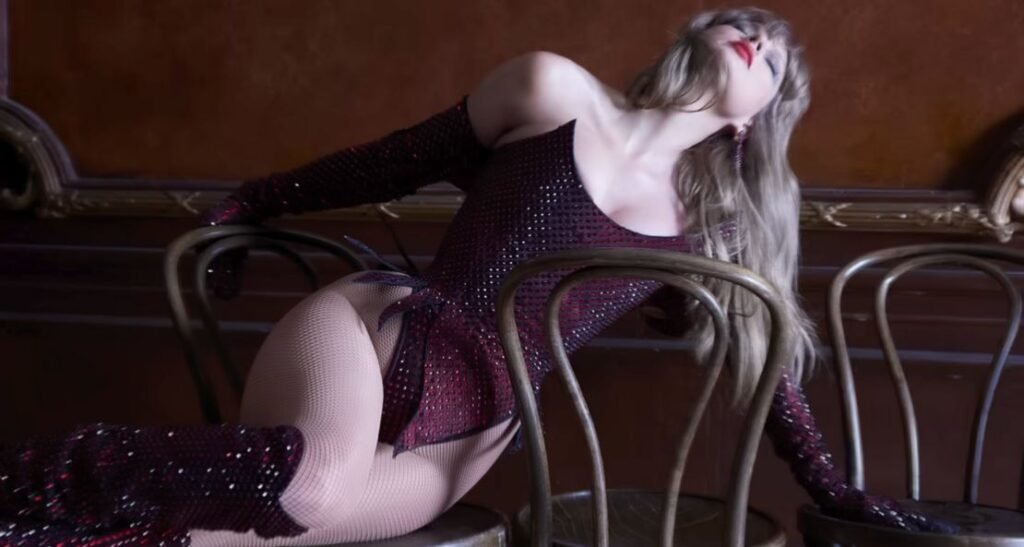Taylor Swift’s “Wood” opens with instrumentation that sounds lifted straight from The Jackson 5’s “I Want You Back”: that driving four-beat drum pattern, memorable bassline, syncopated rhythms, and distinctive high-pitched guitar riffs.
The disco-era groove sits so far outside her established palette that it takes a moment to register what’s happening. Yet the production isn’t the most jarring element.
As lyrical references accumulate, the song reveals itself as perhaps the most deliberately provocative entry in her entire catalog, trading her usual poetic distance for unabashed directness.
The youthful, exuberant sound makes sense as a vehicle for the content, even if the pairing feels awkward at times.
Swift chose joy and brightness to wrap what could otherwise feel crass, a buoyant production that refuses to treat sexual satisfaction as something requiring darkness or secrecy.
Swift described the track to Amazon Music as “a love story” built around superstitions like knocking on wood, black cats, and other symbols of luck.
The song starts genuinely innocent, almost poetic. Swift sings “Daisy’s bare naked, I was distraught / He loves me not, he loves me not”, “Penny’s unlucky, I took him back / And then stepped on a crack / And the black cat laughed”, showing years of anxiety about romantic bad luck.
The pre-chorus offers tentative hope: “And, baby, I’ll admit I’ve been a little superstitious / Fingers crossed until you put your hand on mine”.
The repeated line “I ain’t gotta knock on wood” suggests finding the right person makes superstition irrelevant. At this stage, the track sounds like a simple romantic anthem about getting past relationship fears.
The flirtation begins with clever wordplay that doubles as specific nods to Travis Kelce. The most obvious arrives in the second pre-chorus: “New Heights (New Heights) of manhood (Manhood)”, directly referencing Kelce’s podcast, New Heights.
Swift introduces playful innuendo with “To know a hard rock is on the way” and “The curse on me was broken by your magic wand”, staying just subtle enough while clearly talking about sex.
Even “Redwood tree, it ain’t hard to see” functions as both size metaphor and possible California reference. Swift packs in so many references that the song feels like a private joke between her and Kelce, with fans left to piece it together.
Then comes the shift from clever to explicit. The post-chorus abandons all pretense: “Forgive me, it sounds cocky / He ah-matized me and opened my eyes / Redwood tree, it ain’t hard to see / His love was the key that opened my thighs”.
Swift herself acknowledged this descent, admitting on The Tonight Show that the song started in “a very innocent place” but she doesn’t know “how we got here.” The finished song celebrates sexual satisfaction more directly than even “Dress” or “Guilty as Sin?”
The playful energy didn’t stop at the studio. When Travis Kelce and his brother Jason discussed the track on their New Heights podcast, the exchange perfectly mirrored the song’s cheeky spirit.
Jason pressed his brother on whether he felt “cocky” about the “Redwood tree” reference, then offered his own self-deprecating alternative: if someone wrote a song about him, it would reference a “Japanese maple” instead.
Travis, ever the diplomat, deflected with affection rather than bravado, insisting he simply loves Swift and appreciates any reference she makes.
Jason’s take (that the song’s “wood innuendos” are “childish enough for me that I can get on board”) sums up what makes the song work. It refuses to take itself seriously, and neither should its audience.
Where “Dress” or “Guilty as Sin?” succeeded with sultry suggestion, “Wood” succeeds by being deliberately, hilariously overt.
This campy, unserious tone is something she has long incorporated (coming from her country roots) but never applied so explicitly to sexuality.
What makes the track work is its sheer liberation: Swift, as a 30-something woman, is simply having fun and refusing to be held to the asexual “good girl” standard some still impose upon her.
This is a celebration of happiness and sexual satisfaction. Whether you find it tacky or triumphantly funny, “Wood” is arguably the most talked-about, unapologetic declaration of love (and lust) in her career. Sometimes, a successful dirty joke is better than a dissertation.
You might also like:
-
Taylor Swift’s “The Fate of Ophelia” Lyrics Meaning & Review
-
Taylor Swift’s All Too Well Lyrics, Meaning & The 10-Minute Short Film Explained
-
Taylor Swift’s You’re Losing Me: A Deep Dive into the Heart-Wrenching Ballad
-
Amber Mark “Pretty Idea” Review: Heartbreak on the Dancefloor
-
Anne-Marie “DEPRESSED” Review & Meaning: A Two-Minute Pop Jolt


